If you’re renting a car in Costa Rica, then you absolutely have to research how the road conditions are for your Costa Rica itinerary so that you rent the appropriate vehicle.
In this post, we will share how the road conditions are for popular destinations in Costa Rica.
Planning on renting a car? Get our car rental discount!
This post has affiliate links which we may earn a small commission from if you choose to purchase, at no extra cost to you. Any prices listed may not reflect current pricing. It is the readers responsibility to research current pricing. Prices are quoted in USD. More info: Disclosure
Costa Rica Road Conditions: Popular Routes and Destinations
In this post, we will discuss the roads conditions in La Fortuna, Monteverde, Puerto Viejo de Talamanca, Dominical, Uvita, Ojochal, Central Valley, Manuel Antonio, Jaco, Tamarindo, Osa Peninsula, Ostional, Nosara, Santa Teresa, Montezuma, Turrialba, Playas del Coco, Papagayo Peninsula, Bijagua, Tenorio Volcano National Park, Irazu Volcano National Park, Poas Volcano National Park and La Paz Waterfall Gardens/Peace Lodge.
We try to keep this post as updated as possible but we encourage you to also do your own research as infrastructure has been changing quite a bit in Costa Rica lately.
If you have any concerns or doubts or suggestions of more places to add, please feel free to contact us.
Make sure to read our Driving in Costa Rica guide on how to stay safe behind the wheel.
Arenal and La Fortuna
When it comes to Costa Rica road conditions, the roads to La Fortuna are good from both Costa Rica international airports.
Then the roads in and around La Fortuna are paved, including roads to popular attractions such as La Fortuna Waterfall and Mistico Hanging Bridges.
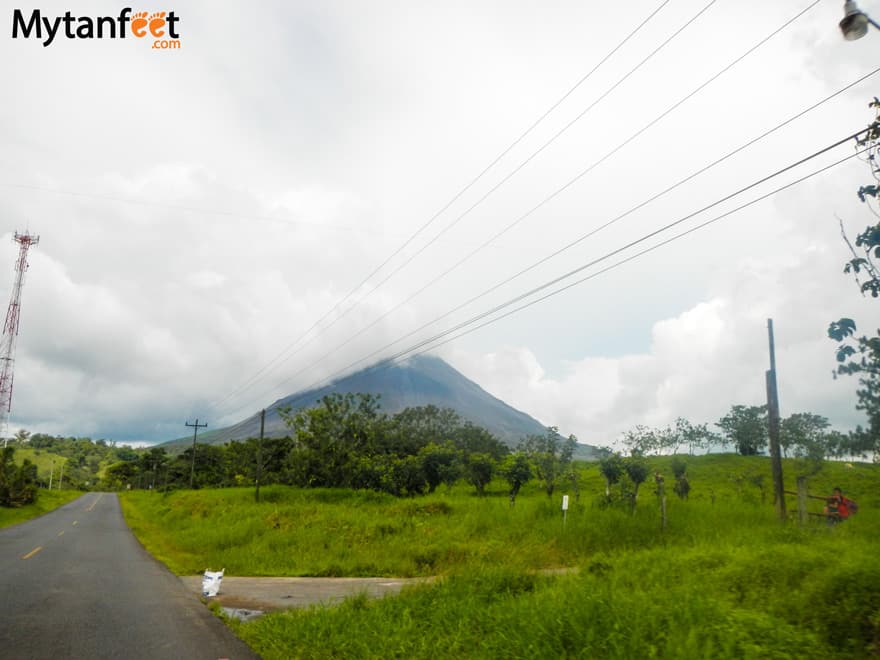
The road to Arenal Volcano National Park is fully paved although there is an unpaved road inside the national park that requires a 4×4 in the Visitor Center Sector. If you don’t have a 4×4, you can walk on that road which leads to a view point.
A 4×4 is not necessary to go to La Fortuna from either international airport in Costa Rica but we highly recommend a high clearance car in the rainier months of August through November.
Planning to visit La Fortuna right after you land? Check our guide on how to drive to La Fortuna after landing so you know how to prepare for your trip.
San Jose to La Fortuna (3-3.5 hours)
From San Jose International Airport, the drive is around 3 hours to La Fortuna. If you’re coming from San Jose downtown, it’s around 3.5 hours.
The route from San Jose to La Fortuna is mostly paved. There is a section up by San Ramon that goes through the mountain cloud forests that is unpaved and without street lights.
It is very curvy and can get extremely foggy in the afternoons and evenings during rainy season (May through November). Drive slow and carefully.
You can see what the drive from San Jose to La Fortuna is like here.
Guanacaste Airport to La Fortuna (3 hours)
The drive from Guanacaste Airport to La Fortuna also takes around 3 hours. It’s a beautiful route and does get very curvy around Lake Arenal, the last hour or so of the drive.
That section doesn’t have any painted lines or street lights.
La Fortuna to Monteverde (3 hours)
The drive between La Fortuna and Monteverde is partially paved, partially unpaved. It becomes unpaved as you go around the lake and then it turns into paved/unpaved sections as you go up the mountain.
The views are gorgeous but highly recommend to have a 4×4 or high clearance car.
Monteverde
Monteverde is one of the destinations in Costa Rica where it is highly recommended to have a high car and a 4×4 in the rainy season.
Although the roads are improving, the small mountain village up in the cloud forest is still rural.
There are two main routes going to Monteverde: Route 145 (Las Juntas) and Route 606 (Sardinal), both of which are mostly asphalted/concrete.
However, it can be slippery when wet. Both of these routes are very curvy as it goes up the mountain.
The main roads around Santa Elena downtown are paved but the roads going to Curi Cancha Reserve, Monteverde Cloud Forest Biological Reserve and Santa Elena Cloud Forest Reserve are not.
Read our detailed post about Monteverde road conditions for more information.
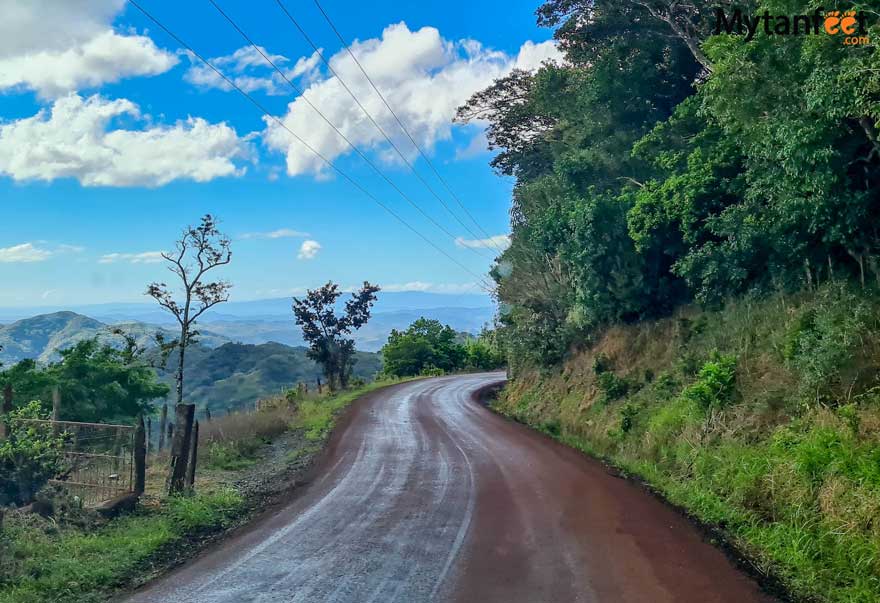
If driving from San Jose, take Route 606. If driving from Guanacaste, take Route 145.
It takes about 3.5 hours both ways depending on how fast you drive. Due to the nature of the road, please drive slowly and carefully as the road goes up a mountain without street lights, painted lines, botts dots and rumble strips and it also doesn’t have guard rails.
Additionally, we do not recommend to drive to Monteverde in the dark (it gets dark by 6 PM everyday in Costa Rica).
The last section up the mountain can be stressful in the dark, especially if it’s raining and you are not used to mountain driving.
Puerto Viejo de Talamanca
Puerto Viejo has fairly good roads in town. The main road that goes along the beaches from town is paved (Route 256).
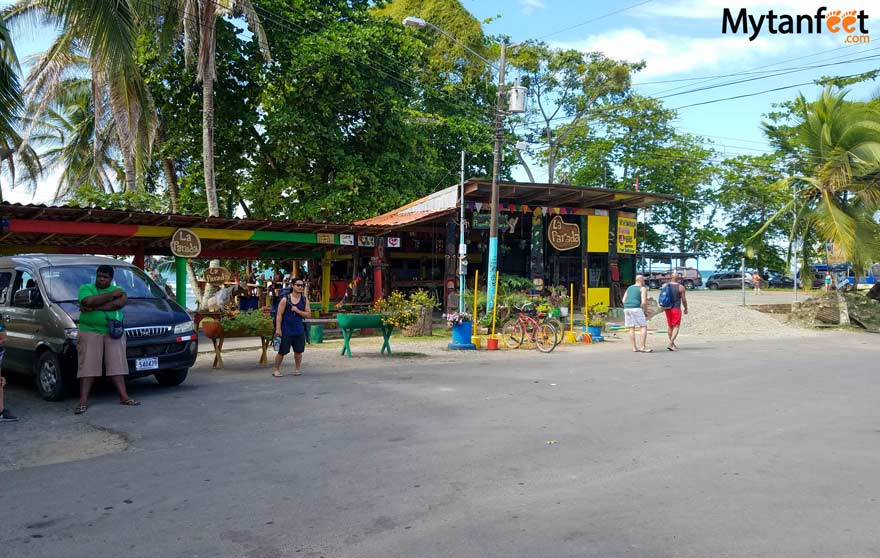
A 4×4 is not required for Puerto Viejo or Cahuita, nor is it required to get from San Jose to Puerto Viejo.
However, the route goes through a very curvy section through the Braulio Carrillo National Park so you must drive very carefully.
Lots of semi-trailers use this road and it is a mountainous, curvy road without street lights, bott dots or rumble strips.
Costa Ballena (Dominical, Uvita, Ojochal)
For the Costa Ballena in the South Pacific, it is highly recommended to have a 4×4 or high clearance SUV.
The main highway, Route 34 is fully paved as well as the roads into the town centers of Uvita and Dominical. Outside those areas, roads are not.
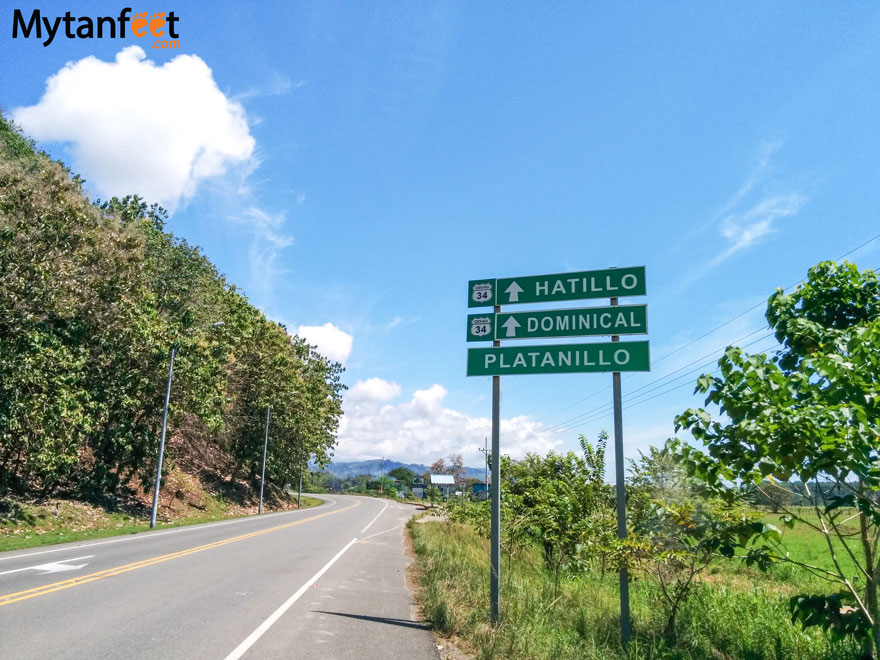
Specifically, the roads going up into the mountains are unpaved and steep and the roads in and around Ojochal are not fully paved either.
If your hotel is up in the mountains of Dominical, Uvita or Ojochal, definitely get a 4×4 as many require it. Some hotels and vacation rentals will specifically say you require a 4×4, so make sure to ask your host.
However, if you plan to stay only in the town center and not explore, then a 4wd is not necessary as the main road is paved.
There are two ways to get from San Jose to the Costa Ballena area.
San Jose to Costa Ballena via Interamericanca Route 1 and Route 34 (~3 hours)
This route goes part of the time on Route 1 Interamericana highway and then onto Route 34 Costanera Sur, which is a very well paved road.
It is super easy to drive since there aren’t a lot of cars and it has nicely painted lines.
San Jose to Costa Ballena via Route 2 AKA Cerro de la Muerte (~3.5 hours)
Route 2 is the route from Cartago down past San Isidro de Perez Zeledon, Platanillo and ends up in Dominical. It’s fully paved but super curvy and gets incredibly foggy near San Gerardo de Dota.
This section of Route 2 is locally known as “Cerro de la Muerte” which literally translates to hill of death due to the high number of accidents. So be very careful when driving this section.
It’s more straightforward to go through Route 34, the Costanera Sur instead of Route 2. and You can drive a lot faster on Route 34 since it’s just a straight road instead of tons of curves.
Central Valley (Alajuela, San Jose, Heredia, Cartago and other small cities like Grecia, Atenas and San Ramon)
Roads are paved in the Central Valley, including the GAM and the small outlying cities. The roads aren’t perfect though, there are pot holes here and there but for the most part, all paved.
Most of the city Costa Ricans drive small compact cars so you don’t need a big car if you’ll be going around these areas.
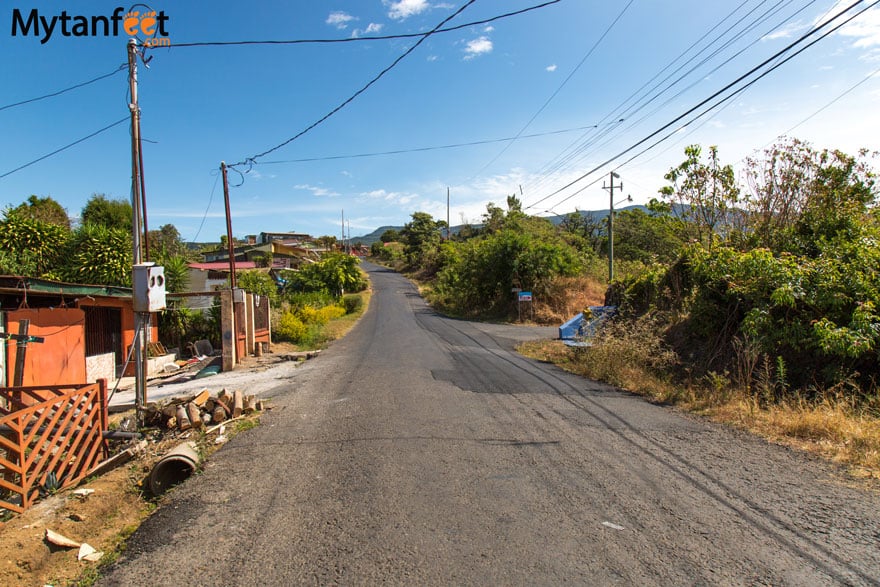
Some hotels in the mountains outside the cities may have unpaved roads but most of them are not too bad. I would check with the hotel just in case if they require a 4×4 or not.
Manuel Antonio and Quepos
The roads around Manuel Antonio and Quepos are paved and in good shape. Although there aren’t really any sidewalks, it is fully paved all the way down to Manuel Antonio National Park.
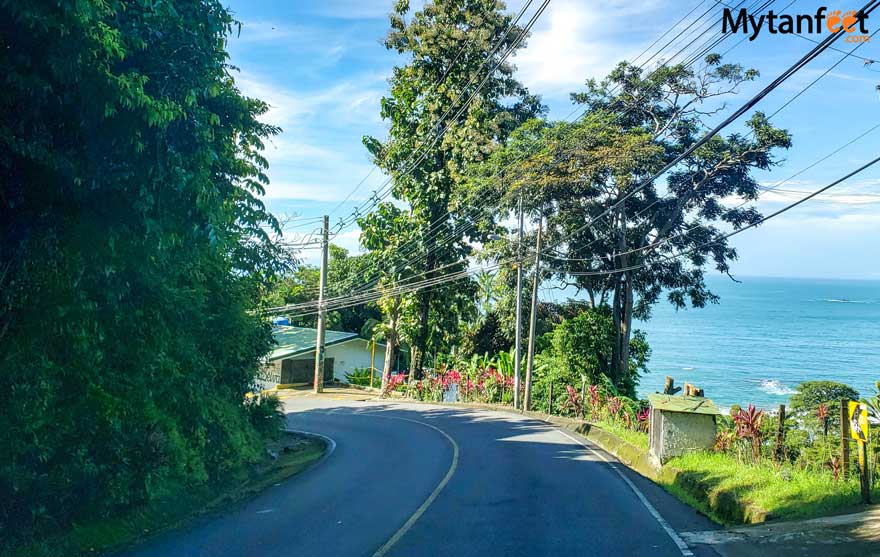
If you aren’t going anywhere outside of Quepos or Manuel Antonio, then a 4×4 is not necessary.
In case you plan to explore or stay at more remote hotels or vacation rentals, then we highly recommend a 4×4. Some places like Kids Saving the Rainforest require a 4×4.
San Jose to Manuel Antonio (3 hours)
Depending on how traffic is getting out of San Jose, this will take roughly 3 hours. Best way to go is via Route 27 and Route 34.
Liberia to Manuel Antonio (4.5 hours)
Liberia to Manuel Antonio is all on main highways, the Interamericana highway 1, Route 27 and Route 34.
Tamarindo to Manuel Antonio (5 hours)
The best route from Tamarindo to Manuel Antonio is via Route 21, Route 18 (Friendship Bridge), Route 1 and Route 34. All paved roads.
If Manuel Antonio is the only destination you’re going to, or Jaco + Manuel Antonio from San Jose, you can rent a sedan for your whole trip.
Jaco
Jaco beach has some of the nicest roads with painted lines and painted parking lines. Make sure to pay attention to the parking signs because the police does give parking tickets in Jaco.
San Jose to Jaco (1.5 hours)
This route is on the highway, Route 27 and Route 34. Easy to drive.
Liberia to Jaco (~3 hours)
Take the Route 1, to Route 27 and then Route 34, all major highways.
Tamarindo to Jaco (4.5 hours)
The best way is Route 160, Route 21, Route 18, Route 1 and then Route 34.
If you’re only visiting Jaco from either San Jose or Liberia, you can rent a sedan.
Osa Peninsula
As a very remote destination in Costa Rica, a 4wd/4×4 is absolutely necessary for the Osa Peninsula.
The main highway, Route 245 that goes down to Puerto Jimenez on the east side of the peninsula is fully paved but it ends once you get into town.
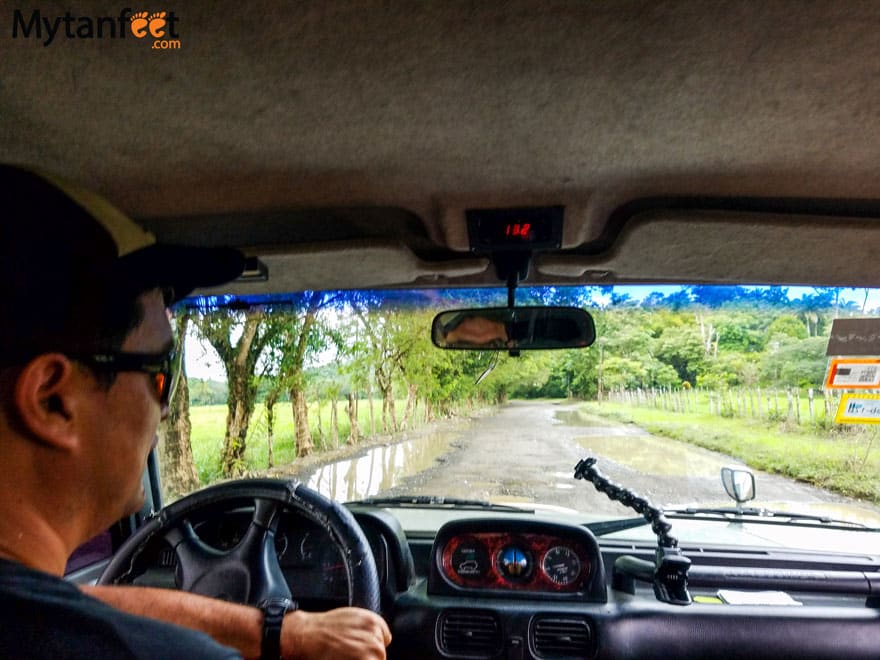
Puerto Jimenez
The main road to Puerto Jimenez is very nicely paved since it goes from the Costanera Sur, past Palmar and all the way down south but it ends once you get to town.
Carate/Matapalo
The road to Carate/Matapalo is extremely bumpy and has a ton of holes. If you’re going all the way to Carate, make sure you check tides because there’s a couple of rivers and in rainy season, they get very full. You can only pass in low tide.
Drake Bay
The road to Drake Bay has improved greatly in the last couple years as they have sort of asphalted the main road. It is not a fully paved road but you can make it in a high clearance 4×2 SUV or 4wd in rainy season.
There are now bridges over the rivers so there aren’t any necessary river crossings to get to Drake Bay.
The best route is via Route 2, Route 245, Rincon de Osa and Rancho Quemado to get to Agujitas de Drake Bay. Read our detailed guide on driving to Drake Bay to plan your trip accordingly.
However, the best way to get to Drake bay is to either take a domestic flight or take the boat from Sierpe to Drake Bay. The drive to Drake Bay is long from San Jose and it’s more fun to fly or boat.
You can drive to Drake Bay if you plan to continue on to other places in the Osa Peninsula like Golfito or Puerto Jimenez.
Tamarindo
The road to Tamarindo is a paved main road. You don’t need a 4×4 and can rent a sedan if you’re only staying in Tamarindo or the area.
If you plan to visit other beach towns around like Playa Conchal, Brasilito, Potrero or Flamingo, a sedan is fine.
If you plan to visit some more remote beaches such as Playa Mina, Playa Real, Playa Negra, Playa Junquillal, Playa San Juanillo or further, a high clearance car will be required.
Liberia to Tamarindo (1 hour)
All on a well paved road via Route 21 and Route 155.
San Jose to Tamarindo (5 hours)
This route is all paved and goes mostly on the highway. You can read our detailed driving to San Jose from Tamarindo guide in the link.
Ostional
From Liberia to Ostional Wildlife Refuge, it is about a 2.5 hour drive via Route 21 and Route 160. From Tamarindo, we take Route 160 going down the coast.
We recommend getting a high clearance SUV in dry season and 4×4 in rainy season to go to Ostional as that road is extremely bumpy being unpaved with lots of potholes. There are some steep hills and there is one main river before you reach Ostional, which now has a bridge.
If you are visiting in peak rainy season months like September, October and November, check the Ostional Guide Association Facebook page for road status updates.
Samara
Samara has paved roads and doesn’t require a 4×4. A section is unpaved but it is nothing bad and can be driven to with a sedan.
Make sure you take the route through Nicoya when driving from Liberia as it’s all paved (Route 21 and Route 150).
Nosara
The better route to go to Nosara is via Route 21 and Route 150. This is paved until you get into the beaches of Nosara. However, a 4×4/4wd is highly recommended for Nosara, especially if you want to go to Ostional, Playa San Juanillo or explore the area.
If you’re adventurous, you can drive down along the coast via Route 160. This road is unpaved nearly all the way through and requires you to cross two rivers to get to Nosara but it is passable in dry season. The driest months where the rivers will be really small are February, March and April.
We do not recommend this route in rainy season (May through November). Remember, car rental insurance will not cover any type of water damage, even if you purchase full protection insurance.
Watch our video of driving from Tamarindo to Nosara below. This video was taken mid April.
Santa Teresa/Mal Pais/Montezuma
For Santa Teresa and Mal Pais, it is recommended to have a 4wd/4×4. Once you get to Santa Teresa, most of the roads in that area are unpaved with big pot holes and there are also some steep mountain roads.
From San Jose, the best route is Route 27 and 23 to Puntarenas, take the Puntarenas ferry to Paquera and then continue onto Route 160 down the Nicoya Peninsula. That route is completely paved and the road from the Paquera ferry to Montezuma is paved.
Beyond Montezuma starting at Cabuyal towards Mal Pais and Santa Teresa, the road is not paved at all.
If you are coming from Liberia, make sure to take paved road around the Nicoya Peninsula (route 21 past Paquera and Route 160). There is no coastal road connecting Liberia to Santa Teresa completely.
Turrialba
4×4 highly recommended. The last section of the road towards Turrialba Volcano National Park is not paved and goes up the steep mountains. The road to Turrialba is paved.
Playas del Coco/Hermosa/Ocotal/Panama
The Gulf of Papagayo including Playas del Coco are easily accessible and on a good road. The road to other beaches like Hermosa, Panama and Ocotal is also on a good road. A 4×4 is not necessary for the Riu Guanacaste Resort.
If you are driving from Tamarindo to Coco or Diamante Eco Adventure Park, then your GPS will tell you go take Route 911 Monkey Trail. Read our post to see what it’s like and how to avoid the river crossings on Route 911.
Rio Celeste (Tenorio Volcano National Park and Bijagua)
The road to Tenorio Volcano National Park from Bijagua where Rio Celeste is is paved/concrete. It is not necessary to have a 4wd in the dry season, however as this area tends to rain more and the road to the park is narrow and can get slippery when wet, we still recommend a 4wd or car with high clearance.
The roads in Bijagua, the main town near the national park are now paved.
Irazu Volcano National Park
You can drive a sedan up to Irazu Volcano National Park from San Jose, the road is all paved. It is a bit curvy as you’re going high up into the mountains of Cartago.
Poas Volcano National Park
The road up to Poas Volcano National Park is completely paved but narrow and curvy. Drive slowly!
La Paz Waterfall Gardens and Peace Lodge
The road to Peace Lodge and La Paz Waterfall Gardens is completely paved but is narrow, curvy and windy. Make sure to drive slowly, especially in rainy season.
Do not ride your brakes when coming down this hill, you may burn them out.
Car Rental Discount
Now you know what the road conditions in Costa Rica are like for popular destinations. Don’t forget to get our Costa Rica car rental discount with our extra benefits in this link to save some money!
Read other Costa Rica travel tips below!
Costa Rica ultimate survival guide
Tips for driving in Costa Rica
Best places to visit in Costa Rica
Costa Rica Vacation Checklist
- First time to Costa Rica? Read our First Time in Costa Rica guide.
- Not sure how to move around Costa Rica? Read our How to Get Around Costa Rica guide to find the best transportation method for you.
- Click the link to get our detailed Costa Rica Packing List so you know what essential items to bring.
- Check our Costa Rica destinations map and Costa Rica restaurant map
- Do not forget to purchase Travel Insurance for your trip to Costa Rica.
- Stay connected by purchasing a prepaid SIM Card in Costa Rica.
- Save money with Mytanfeet Deals for tours and hotels and our Costa Rica Car Rental Discount.

Camille says
Hi there. We are visiting in early June. What is the best route from Bijagua to Nosara and Nosara to Playa Potrero? Thank-you!!
yeison says
Hello,
I would go to Route 1, then turn left to Limonal to use the bridge route. From there, follow the regular road to Nicoya and take Route 150. To get to Potrero, head back to Nicoya, take Route 21, then turn at the Tamarindo intersection in Santa Cruz. From there, follow the main road to Huacas (Route 155), then take Route 180 to get to Potrero.
Try to avoid Route 160 along the coast…that road isn’t fully paved and has some big pot holes, especially as it’s been raining.
Jessica says
Thanks so much for this informative blog!!!! I will be going to Costa Rica at the end of March and will be booking a rental using your suggested rental company and discount. I have read this page and many of the comments but haven’t seen any details around the La Fortuna to Manuel Antonio road trip. Will I need 4 wheel drive for this, or will a standard car be fine? We will be going from San Jose to La Fortuna, La Fortuna to Manuel Antonio, and then back to San Jose.
Thanks in advance!
Sammi says
Hi Jessica, for those destinations, a standard car can work if your hotels do not require high clearance or a 4wd. Also just make sure to check the places you’re visiting, most do not require a 4wd but if you plan to go up outside into the mountains, especially in Manuel Antonio, some may.
BONNIE YOUNG says
Hello and thank you for all of your information.
We would like to know if you have any information on the road from Sierpe to Puerto Jimenez; is it realistic to drive that stretch? We are doing a 3 week driving tour in January.
Thanks so much!
Bonnie
Sammi says
Hello Bonnie, the road from Sierpe to Puerto Jimenez is a fully paved road. Once you are in Puerto Jimenez, the small roads are unpaved as well as the road further down south to Carate and Matapalo. We’ve also sent you an email with more information.
Regent Payne says
Hello!
I was wondering about the road conditions from La Fortuna to Cataratas Finca Dos Rio in March? I am going on a 7 am tour so I was hoping to leave around 5 am to make it. Is this enough time? Are the roads ok to drive on at 5am at least route 4 for a while in the dark? Thanks!
Sammi says
We actually haven’t been to Finca Dos Rios so you will need to contact them to see what kind of vehicle is required to reach their property
Elizabeth Brooks says
How would you recommend getting from Liberia to bejuca? We are coming mid April. The rental owner said the way don’t recommend Liberia because it can take 7 hra to drive. We already have flights but now she has me concerned. From my other research and looking at your site it doesn’t look that bad! We will also be staying in Uvita. Any help is appreciated!
Sammi says
You can drive, it’s a very long drive but all on highways, I will say that she is right though, although google Maps says around 4 hours, it’ll most likely take you like 6 including stops and lots of traffic. Then if there are any accidents on the road, strikes, road closures, etc. it can take even longer. I’d break up the drive if I were you to not do it in one day, especially if you’re landing in the late afternoon because we don’t recommend driving long routes at night for tourists.
Lance Henderson says
Hello!
Thanks for the great blog and helpful info. We are planning a trip in April 2023, and will fly into San Jose. We plan to drive a rental car to Samara and wondered what is the best way to get there?
Would it be a good idea to take the Interamericana highway 1 to Route 18 over to Nicoya, and then by Route 21 and Route 150 down into Samara?
About how long of a drive is it (we are hoping to make it in one day).
Thank you!
Sammi says
Yes the one that google maps pulls up is fine through Nicoya, according to Google Maps the drive is approximately 4 hours and 8 minutes.
Nancy Mittleman says
We are planning on renting a car in Costa Rica – here is our itinerary:
San Jose to La Pavona (where we will park to go to Tortuguero for the night)
La Pavona to Arenal (La Fortuna)
La Fortuna to Monteverde
Monteverde to Tamarindo
Tamarindo to Liberia Airport
I would love to give my business to a local company, but Adobe does not have a 4X4 available. Do you think a standard SUV would be ok? We are traveling from Oct 28 – Nov 10.
yeison says
Hello Nancy,
Thank you for your comments, I see that we are already talking via email, we will answer your last email shortly.
🙂
Jhan Ford says
You guys are awesome! Do you have any tips for the drive from Uvita to Cahuita? I imagine we have to go to San Jose and then down to Cahuita. Any advice is appreciated. Yes, I know we are biting off a lot, but oh well! We are going to be doing the drive in the first week of November.
Sammi says
I would personally stay a night in San Jose because that’s a really really long drive and the road from San Jose – Cahuita has been undergoing some problems lately due to the rainy season (landslides, road closures, etc.)
Andre Wells says
Can you provide any information on how the drive is from Playa Flamingo to Rincon De La Vieja? We will be recalling early August.
Sammi says
If you’re going to the Las Pailas sector, it is majority paved until the last bit of the road up to the park entrance but it is not bad, it is a straightforward drive, a bit curvy when you turn into Rincon de la Vieja from the Interamericana highway 1 though so take note if you get car sick
Yvette says
Hi !I appreciate people like yourself who give this type of information for visitors. We will be going to Costa Rica in two weeks and torn between needing a 4×4 or not. We will be flying into SJO and heading to la fortuna then from la fortuna we will be going to tamarindo. Do you think we will be fine without a 4×4?
Sammi says
4×4 not required on the routes to get there – i would just check with the hotels you’re staying at and where you plan to visit in case those places require a 4wd. Right now in dry season, a car with high clearance is better but if you’re staying on the main roads and not going off exploring really, a sedan is fine.
Teresa says
Is driving from Liberia to San Jose airport safe at 3am?
Sammi says
You could do it as there won’t be any traffic or congestion but make sure you are very alert and get a local phone number in case of emergencies Do note nothing will be open (no supermarkets, no restaurants, etc. etc.) but gas stations are normally 24/7 here. Do also note this is a 4 hour drive so it’s very long, we recommend to stay in Liberia close by the airport when you land and then leave the next day after a good nights sleep.
Melissa says
Hello! We are flying into Liberia, going to La Fortuna and then to Westin Playa Conchal and back to Liberia…will a sedan be ok for all of these roads? Thank you!
Sammi says
Yes but check your hotels in Liberia and La Fortuna to make sure they don’t require another type of car
Leo says
Hi
Great blog.
We are planning to go from Monteverde to Puerto Viejo and we’re wondering what the best route would be.
We went from La Fortuna to Monteverde and it was very very windy and of course bumps and potholes up to Monteverde.
Thanks
Sammi says
Here is the Google Maps: https://goo.gl/maps/vh86a2ZJnyXoPttt9
It’s a long drive so I’d definitely stay somewhere halfway in between
Dave Stamboulis says
Hi guys, great informative blog. Can you update on Santa Teresa/Montezuma. I’ve been told that the road to Santa Teresa is now completely paved. I’m assuming if you are in Montezuma you have to go back up 624 to Cobano and then down one of those roads to Santa Teresa?
Sammi says
The main road to Santa Teresa is paved, but most of the roads in town are not, there is just a short section that is paved and rest is unpaved.
Kali says
First, this is a great blog. I appreciate all the work that has gone into it. It’s very informative. I’ve read through many of your packing/driving tips and watched many of the videos.
We’ll be renting a 4×4 and from LIR will be driving to Bijagua then onto Santa Elena in late November. It looks like from Bijagua to Santa Elena we have a few routes to choose from. We would like to take the smoothest and safest route, what roads would you suggest we take? We plan to leave early in the AM to allow plenty of driving time.
Following Santa Elena we will be driving to Samara is there a particular route you would recommend, that again is the “smoothest”. I’m traveling with family of all ages and between the young and old I’d like to give them as smooth and least hairpin turns as possible (if that exists).
I’m assuming it might take up to 4 hours to go from Bijagua to Santa Elena and then when leaving Santa Elena another 4 hours to reach Samara?
Sammi says
From Bijagua to Monteverde, you can go back down on the InterAmericana highway 1 and then take Route 145. Then Monteverde to Samara, go back down on Route 142 and then take Route 18 to Nicoya and then go to Samara
Cynthia Williford Bean says
Hi! We’re coming in October and will be driving from the San Jose airport to La Fortuna, from La Fortuna to Tamarindo, then from Tamarindo back to the San Jose airport. Would we be okay to rent a sedan or do we need a 4×4?
Sammi says
All those routes are paved so a sedan is fine but just make sure to ask your hotels if they require a 4×4 or 4wd.
Kendra says
Would a Sedan be fine from Samara to La Fortuna?
Sammi says
Yes, just make sure to take the route through Nicoya and stay on the main route 150
Charlotte says
Hi! Suggestions on route/type of car we should rent for a trip from Santa Teresa to La Fortuna?
Thank you in advance, you guys are awesome:)
Sammi says
A 4×4/4wd if in rainy season. If in dry season, something with high clearance like a Hyundai Creta works.
Jared Norwood says
Hello, my itinerary is San Jose- Arenal-jaco- Manuel Antonio
I see most of this covered above, but not the Arenal- jaco part. Is a 4wd needed?
Sammi says
The route goes through a highway and main roads so it’s paved, 4×4 not necessary (but make sure to check your lodging in case they do)
Brittany says
Hello,
Any information on a route from Puerto Viejo to La Fortuna?
Thanks!
Sammi says
It’s a long drive but you can take the Route 32 to Route 4 if you’re going from Puerto Viejo de Talamanca in Limon.
Mike Rossi says
Thanks for the detailed info! We’re coming for two weeks at the end of July, and it seems the only place we’re visiting that you recommend a 4×4 is when we go to Monteverde. During that time of the year, is there any way to get to Monteverde in a larger sized sedan? Besides a 4×4 costing me $200+ over the two weeks, I like the idea of having a trunk that locks and takes our belongings out of view if we’re traveling between spots and can’t drop our bags at our new place we’re staying. Your blog is wonderful so thanks again for all of the great info!
Sammi says
Hi Mike, July is during our rainy season and Monteverde tends to rain more so a 4wd is highly recommended for rainy season in Monteverde. (A sedan, whether it’s a big or small sedan is not 4wd)
Gaby says
Hi Sammi and Yeison.
Your blog is out of this world! Thank you for all your time and effort you put into it.
I do have a question about the road conditions. I have been reading on Facebook and the news say that Ruta 160 is destroyed by the recent rainfalls and wanted to check out with you guys that are there (in Costa Rica). What parts of the road are affected? Should I just avoid the whole mid/south Nicoya Peninsula or is it safe to drive around? Plans were to visit a lot of stuff in between Tamarindo and Montezuma but now I don’t know because of this Thanks!!!
yeison says
Hello Gaby,
Thank you for the nice comments about the blog 🙂
The route 160 always has problems during the rainy season, this route is mostly a gravel road and you will have to cross a 2 or 3 rivers that 11 months of the years are perfectly fine to cross, however when the area gets a lot of rain, rivers get high and cars can’t cross the river. Just last week the river that you need to cross to get to Ostional got super high and people had to wait for river to get lower.
If you are planning to come during the dry season you will be fine, local governments always fix the “roads” after the heavy part of the rainy season.
My recommendation is to always check the day before you come or you drive this route things here changes very quicky one day the road can be perfectly fine and then the next day you can’t use it (especially during heavy rains), you can also use the paved roads that connect those areas, for example, if you are planning to go to Nosara and you heard that the 160 is not in good shape you can use the route 21 to Nicoya then the 150 to Samara and the section from Samara to Nosara is usually in good conditions even in the rainy season, same with Montezuma you can take the 21 and go all the way down (public buses use the #21).
Thank you again for reading our blog!
sian says
Thank you so much for your amazing blog!! So so grateful for all the information! What is it like to drive from La Fortuna to Monteverde? Also if we are driving to Sierpe to get the boat to Drakes bay will we still need a 4×4?
Sammi says
Hi Sian, the drive from Fortuna to Monteverde is on an unpaved road. It takes around 3 hours or so.
You will need the high car to get out of Monteverde, once you get onto the highway, it is a paved main road down to Sierpe. It gets unpaved for a little bit on the road to Siepe when you turn off the highway but it is not bad.
Gloria Barber says
we will be driving from Liberia Airport to El Castillo next March, 2020. what vehicle do you recommend and how long is the drive? Absolute excellent blog site!
Sammi says
Depending on how many people you have, the road from La Fortuna to El castillo is mostly gravel but it is not bad and doesn’t require a high car or 4×4. It’s about 3.5 – 4 hours from Liberia Airport.
Amie says
Thank you for this great blog! We are staying in Dominical up in a mountain house. Do we need a 6v or 8v, or is a standard 4×4 (4 cylinder) okay? We are going in July.
Thanks!
Sammi says
Hi Amie! That depends on how steep/muddy the road is, I would recommend to ask your host because in that area, they do have some pretty steep roads and can get very muddy in rainy season (and that area tends to rain a bit). Generally a 4 cylinder is fine but it is hard to say for sure without seeing the road so I would check with your host.
Laura says
Hi, I’m headed from LA Fortuna to the ferry parking at tortuguera at the end of August and from there down the coast to Puerto Viejo. I don’t see anything specific to that route and wanted to be sure I don’t need a 4×4 or anything other than a regular sedan for those roads? Thank you!
Sammi says
There is a part of the road to la Pavona parking lot to Tortuguero is unpaved but it is not bad and from Puerto Viejo to La Fortuna it is on a major road so a sedan should be fine.
Cristina Flippen says
Can we get by with a sedan from the SJO airport to Villa Blanca in the Cloud Forest , from Villa Blanca to Hotel San Bada, from Hotel San Bada to Villas Sol in Playa Hermosa, from Villas Sol to Los Lagos in th Arenal area and from Los Lagos to the Bambú area of San Jose?
Sammi says
Hi Cristina, I’m not sure where Villa Blanca is but if it’s in Monteverde, then you need to have a high car. The roads in and around Monteverde are in unpaved, potholey and very hilly since it’s up in the mountains and a high car is required.
Sofia B Ketcham says
Hi! From Uvita, there are a few different routes to go to Cahuita. We definitely do not want to go through erro de la muerte. We do have a 4×4 vehicle but looks like it will rain all week so want to avoid steep and windy roads w no barriers if possible. What do you recommend?
yeison says
Hi! If you don’t want to go through Cerro de la Muerte, you’ll need to go all the way to San Jose. From there, you can either take Route 32 (Zurquí Tunnel) or go via Turrialba. Those are paved roads, although some mountain roads but not as intense as Cerro de la Muerte. It will take longer, especially since there tends to be more traffic in San Jose, so I would recommend to consider even staying a night in in San Jose.
I hope this helps and thank you for reading Mytanfeet.
David says
Hi, I have a question. Can I get by with a regular sedan in Montezuma? Is it that bad?
Sammi says
Hi David, you can technically get by with a sedan to Montezuma, depending on where you’re coming from and where you’re going afterwards. The road from Paquera if you take the ferry is unpaved but not too horrible but the road from Montezuma to Mal Pais through Cabuya is pretty rough and we definitely recommend a high car. You can get by with a sedan if you go super super slow but you may damage the bottom since it’s so low so if you get a sedan, I’d recommend purchasing full insurance since there is a huge chance to hit the bumper or damage the bottom.
Brady and Shelly says
Great list of road! We drove the Osa Peninsula in our 1998 Jeep Grand Cherokee 4×4 and couldn’t have done it without it. We had to cross 7 rivers to get to San Josecito, and one of them was quite deep (up to the top of the hood) and we barely made it across. So, keep that in mind if you think you can just take any car off-road here, you won’t make it far.
Sammi says
Oh wow I bet it was even crazier back in 1998! We went in July last year and the rivers thankfully weren’t that high though we did time it so we drove in low tide. But yes, definitely – you won’t make it far and it won’t be a very pleasant drive!